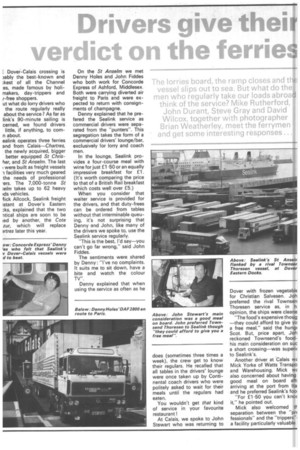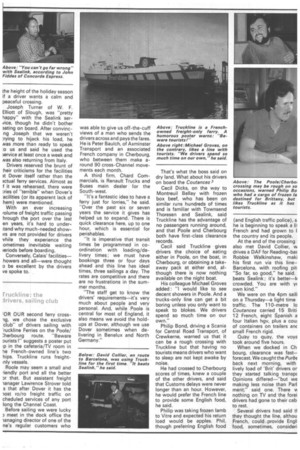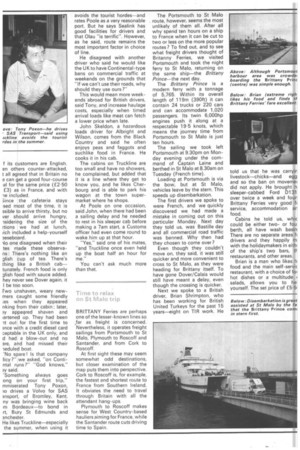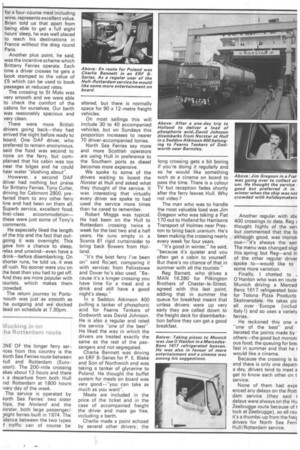Drivers give thei ----" on the ferrie
Page 42

Page 43

Page 44

Page 45

If you've noticed an error in this article please click here to report it so we can fix it.
The lorries board, the ramp closes and t vessel slips out to sea. But what do th( men who regularly take our loads abrothink of the service? Mike Rutherford, John Durant, Steve Gray and David Wilcox, together with photographer Brian Weatherley, meet the ferrymen and get some interesting responses ...
Dover-Calais crossing is )ably the best-known and ;kest of all the Channel es, made famous by holimakers, day-trippers and f-free shoppers.
ut what do lorry drivers who the route regularly really about the service ? As far as link's 90-minute sailing is cerned, we found drivers little, if anything, to cornn about.
ealink operates three ferries and from Calais—Chartres, the newly acquired, bigger better equipped St Chrisher, and St Ansel»). The last I were built as freight vessels 1 facilities very much geared the needs of professional • ers. The 7,000-tonne St ;elm takes up to 62 heavy ids vehicles.
lick Allcock, Sealink freight stant at Dover's Eastern 7.ks, explained that the two itical ships are soon to be ied by another, the Cote zur, which will replace rtres later this year. On the St Anselm we met Denny Holes and John Fiddes who both work for Concorde Express of Ashford, Middlesex, Both were carrying diverted air freight to Paris and were expected to return with consignments of champagne.
Denny explained that he prefered the Sealink service as commercial drivers were separated from the "punters". This segregation takes the form of a commercial drivers' lounge/bar, exclusively for lorry and coach men.
In the lounge, Sealink provides a four-course meal with wine for just £1 .50 or an equally impressive breakfast for £1. (It's worth comparing the price to that of a British Rail breakfast which costs well over £5.) When you consider that waiter service is provided for the drivers, and that duty-frees can be ordered from tables without that interminable queuing, it's not surprising that Denny and John, like many of the drivers we spoke to, use the Sealink service regularly.
"This is the best, I'd say—you can't go far wrong," said John Fiddes.
The sentiments were shared by Denny : "I've no complaints. It suits me to sit down, have a bite and watch the colour TV".
Denny explained that when using the service as often as he does (sometimes three times a week), the crew get to know their regulars. He recalled that all tables in the drivers' lounge were once taken up by Continental coach drivers who were politely asked to wait for their meals until the regulars had eaten.
You wouldn't get that kind of service in your favourite restaurant I At Calais, we spoke to John Stewart who was returning to Dover with frozen vegetablE for Christian Salvesen. Joh preferred the rival Townsen Thoresen service as, in h opinion, the ships were cleane "The food's expensive thoug —they could afford to give yo a free meal," said the hungi Scot. But, price apart, Joh reckoned Townsend's foodhis main consideration on suc a short crossing—was superic to Sealink's.
Another driver at Calais Mick Yorke of Watts Transpo and Warehousing. Mick wi also concerned about having good meal on board aft arriving at the port from Ita and he preferred Sealink's foo "For £1.50 you can't kno( it," he pointed out.
Mick also welcomed separation between the "pt.( fessionals" and the "trippers"a facility particularly valuable
the height of the holiday season if a driver wants a calm and peaceful crossing.
Joseph Turner of W. F. Elliott of Slough, was "pretty happy" with the Sealink service, though he didn't bother 3ating on board. After convincng Joseph that we weren't :rying to hijack his load, he as more than ready to speak :o us and said he used the :iervice at least once a week and Nas also returning from Italy. Drivers reserved the brunt of :heir criticisms for the facilities It Dover itself rather than the 3ctual ferry services. Almost as f it was rehearsed, there were ;ries of "terrible" when Dover's acilities (or its apparent lack of hem) were mentioned.
With an ever increasing folume of freight traffic passing hrough the port over the last en years, it's hard to under;tend why much-needed showirs are not provided for drivers vhile they experience the ometimes inevitable waiting periods before boarding, Conversely, Calais' facilitieshowers and all—were thought o be excellent by the drivers ve spoke to.
rruckline: the irivers, sailing club
OR OUR second ferry cross we chose the exclusive club" of drivers sailing with :ruckline Ferries on the Poole/ :herbourg route. "Beware Durists !" suggests a poster put lp in the cafeteria/TV room in he French-owned line's two hips. Truckline runs freightnly vessels.
Poole may seem a small and lendly port and all the better Dr that. But assistant freight -lanager Lawrence Strayer told s that after Dover it has the lost ro/ro freight traffic on cheduled services of any port long the Channel Coast.
Before sailing we were lucky D meet in the dock office the ianaging director of one of the ne's regular customers who was able to give us off-the-cuff views of a man who sends the drivers across and pays the fares. He is Peter Baulch, of Axminster Transport and an associated French company in Cherbourg, who between them make around 90 cross-Channel movements each month.
A third firm, Chard Commercials, is Renault Trucks and Buses main dealer for the South -west.
"It's a fantastic idea to have a ferry just for lorries," he said. "Over the past six or seven years the service it gives has helped us to expand. There is quick clearance here, up to one hour, which is essential for perishables.
"It is imperative that transit times be programmed in coordination with loading/delivery times ; we must have bookings three or four days ahead and this line has ideal times, three sailings a day. The rates are competitive and there are no frustrations in the summer months.
'The staff get to know the drivers' requirements—it's very much about people and very personal. And, while Poole is central for most of England, it also means we avoid the holdups at Dover, although we use Dover sometimes when delivering in Benelux and North Germany." That's what the boss said on dry land. What about his drivers on board the Coutances?
Cecil Dicks, on the way to Montreuil Bellay with frozen box beef, who has been on similar runs hundreds of times and is familiar with Townsend Thoresen and Sealink, said Truckline has the advantage of no passengers running around, and that Poole and Cherbourg both have first-class clearance records.
Cecil said Truckline gives drivers the choice of eating either in Poole, on the boat, in Cherbourg, or obtaining a takeaway pack at either end, although there is now nothing available on the night boat.
His colleague Michael Groves added : "I would like to see decent showers in Poole. And a trucks-only line can get a bit boring unless you only want to speak to blokes. We drivers spend so much time on our own."
Philip Bond, driving a Scania for Central Road Transport, of Crewkerne, warned us that it can be a rough crossing with Truckline but that having no tourists means drivers who want to sleep are not kept awake by noise.
He had crossed to Cherbourg scores of times, knew a couple of the other drivers, and said that Customs delays were never longer than an hour. However, he would prefer the French line to provide some English food, he said.
Philip was taking frozen lamb to Vitre and expected his return load would be apples. Phil, though preferring English food
(and English traffic police), s he is beginning to speak a lii French and had grown to I the country and its people.
At the end of the crossing also met David Collier, w drives a DAF for Reading-ba5 Robbie Walkinshaw, maki his first run via this line— Barcelona, with roofing pit, "So far, so good," he said. beats Sealink; it's better—li crowded. You are with y( own kind."
We were on the 4pm saili on. a Thursday—a light time traffic. The 110-metre lo Coutances carried 15 Briti 12 French, eight Spanish a four Italian hgv, plus a coup of containers on trailers anc small French rigid.
Ou'ay to quay, the voya took around five hours.
When we docked in Ch bourg, clearance was fast— forecast. We caught the Purbe back next morning, with lively load of 'Brit' drivers or they started talking transpr Opinions differed—"but we making less noise than Pad ment," said one. There v% nothing on TV and the forei drivers had gone to their cab to rest.
Several drivers had said ti they thought the line, althou French, could provide Engli food, sometimes, consideri
f its customers are English. en others counter-attacked, t all agreed that in Britain no e can get a good four-course al for the same price (£2.50 £3) as in France, and with -le included.
;ince the cafeteria stays sed most of the time, it is ssible to arrive thirsty, but no ver should arrive hungry, isidering the size of the Mons we had at lunch, iich included a help-yourself aeseboard.
go one disagreed when their tes made these observans : There's nothing like an glish cup of tea. There's thing like a British cabtunately. French food is only glish food with sauce added. hey never see Dover again, it I be too soon.
Iwo unshaven, weary newmers caught some friendly :es when they appeared nking from their cabin ; later, appeared shaven and artened up. They had been it out for the first time to )nce with a credit diesel card ceptable in the UK only, and d had a blow-out and no are, and had missed their ieduled boat.
'No spare ! Is that company licy ?' we asked, "on Contintal runs ?" "God knows," ?.y said.
'Something always goes ong on your first trip," mmiserated Tony Poxon, io drives a Volvo for SAS msport, of Bromley, Kent, ny was bringing wine back m Bordeaux—to bond in rt, Bury St Edmunds and
3nchester.
He likes Truckline—especially the summer, when using it avoids the tourist hordes—and rates Poole as a very reasonable port. But he says Sealink has good facilities for drivers and that Olau "is terrific". However, as he said, route remains the most important factor in choice of line.
He disagreed with another driver who said he would like the UK to have Continental-type bans on commercial traffic at weekends on the grounds that "If we can't use their roads, why should they use ours ?"
This would mean more weekends abroad for British drivers, said Tony, and increase haulage costs, especially when timed arrival loads like meat can fetch a lower price when late.
John Skeldon, a hazardous loads driver for Albright and Wilson, comes from the Black Country and said he often enjoys peas and faggots and suchlike food in France. He cooks it in his cab.
The cabins on Truckline are too small and have no showers, he complained, but added that it is a line where they get to know you, and he likes Cherbourg and is able to park his wagon at the town supermarket where he shops.
At Poole on one occasion, said John, when there had been a sailing delay and he needed to rest in his sleeper cab before making a 7am start, a Customs officer had even come round to wake him up at that hour.
"Yes," said one of his mates, "and Truckline once even held up the boat half an hour for me."
You can't ask much more than that.
Time to relax on St Maio trip
BRITTANY Ferries are perhaps one of the lesser-known lines so ,far as freight is concerned. Nevertheless, it operates freight sailings from Portsmouth to St Malin, Plymouth to Roscoff and Santander, and from Cork to Roscoff.
At first sight these may seem somewhat odd destinations, but closer examination of the map puts them into perspective. Cork to Roscoff is, for example, the fastest and shortest route to France from Southern Ireland. It obviates the need to travel through Britain with all the attendant hang-ups.
Plymouth to Roscoff makes sense for West Country-based hauliers aiming for France, while the Santander route cuts driving time to Spain. The Portsmouth to St Malo route, however, seems the most unlikely of them all. After all why spend ten hours on a ship to France when it can be cut to two or less on the more popular routes ? To find out, and to see what freight drivers thought of Britanny Ferries, we visited Portsmouth and took the night ferry to St Malo, returning on the same ship—the Brittany Prince—the next day.
The Brittany Prince is a modern ferry with a tonnage of 5,765. Within its overall length of 119m (390ft) it can contain 24 trucks or 220 cars and can accommodate 1,020 passengers. Its twin 6,000hp engines push it along at a respectable 19.5 knots, which means the journey time from Portsmouth to St Malo is just ten hours.
The sailing we took left Portsmouth at 9.30pm on Monday evening under the command of Captain Laine and berthed in St Maio at 8.30am on Tuesday (French time).
Loading at Portsmouth is via the bow, but at St Maio, vehicles leave by the stern. This speeds up disembarkation.
The first drivers we spoke to were French, and we quickly discovered we had made a mistake in coming out on this particular Monday. Next day they told us, was Bastille day and all commercial road traffic was banned. Why then had they chosen to come over ?
Even though they couldn't move on, they said, it was still quicker and more convenient to cross to St Maio, as they were heading for Brittany itself. To have gone Dover/Calais would still have meant a delay, even though the crossing is quicker.
Next we spoke to a British driver, Brian Shrimpton, who has been working for British United Turkeys for the past 15 years—eight on TIR work. He told us that he was carryin livestock—chicks—and egg and so the ban on movemei did not apply. He brought h sleeper-cabbed Ford D131 over twice a week and foun Brittany Ferries very good fi service, accommodation an food.
Cabins he told us, whic could be either twoor fou berth, all have wash basin There are no separate areas fi drivers and they happily m with the holidaymakers in eithi of the ship's two bars, th restaurants, and other areas.
Brian is a man who likes h food and the main self-servic restaurant, with a choice of fol hot dishes or a multitude salads, allows you to hel yourself. The set price of £5.51 for a four-course meal including wine, represents excellent value. Brian told us that apart from being able to get a full eight hours' sleep, he was well placed to reach his destinations in France without the drag round Paris.
Another plus point, he said, was the incentive scheme which Brittany Ferries operate. Each time a driver crosses he gets a book stamped to the value of £5 which can be used to book passages at reduced rates.
The crossing to St Maio was very smooth and we were able to check the comfort of the cabins for ourselves. Our berth was reasonably spacious and very clean.
There were more British drivers going back—they had arrived the night before ready to board. One OAF driver, who preferred to remain anonymous, said the food was second to none on the ferry, but complained that his cabin was too near the bilges and he could hear water "sloshing about".
However, a second DAF driver had nothing but praise for Brittany Ferries. Tony Cutler, driving for Cabmont 2800, preferred them to any other ferry line and had been on them all. Superb service, excellent food,
first-class accommodation— these were just some of Tony's comments.
He especially liked the length of the trip and the fact that outgoing it was overnight. This gave him a chance to sleep, relax and unwind—even have a drink—before disembarking. On shorter runs, he told us, it was all rush. No sooner were you on the boat than you had to get off. And they are more popular with tourists, which makes them crowded.
The return journey to Ports-nouth was just as smooth as :he outgoing and we docked dead on schedule at 7.30pm.
Vlucking in on :he Rotterdam route )NE OF the longer ferry sereices from this country is the \lorth Sea Ferries route between -lull and Rotterdam (Euro)oort). The 200-mile crossing akes about 13 hours and there 5 a departure from both Hull nd Rotterdam at 1800 hours ,very day of the week.
The service is operated by Jorth Sea Ferries' two sister hips, the Nor/and and the iorstar, both large passenger/ 'eight ferries built in 1974. The ,alance between the two types f traffic can of course be
altered, but there is normally space for 90 x 12-metre freight vehicles.
On most sailings this will include 30 to 40 accompanied vehicles, but on Sundays this proportion increases to nearer 70 driver-accompanied lorries.
North Sea Ferries say more and more Scottish operators are using Hull in preference to the Southern ports as diesel becomes more expensive.
We spoke to some of the drivers waiting to board the Norstar at Hull and asked what they thought of the service. It was interesting that virtually every driver we spoke to had used the service more times than he cared to remember.
Robert Meggs was typical. He had been on the Hull to Rotterdam crossing twice a week for the last two and a half years. He runs empty in a Scania 81 rigid curtainsider to bring back flowers from Holland.
"It's the best ferry I've been on" said Rcoert, comparing it with service: from Felixstowe and Dover he's also used. "Because it's a longer crossing you have time for a meal and a drink and still have a good night's sleep."
In a Seddon Atkinson 400 pulling a tanker of phosphoric acid for Fearns Tankers of Dodworth was David Johnson. He is also a regular and rated the service "one of the best". He liked the way in which the drivers are treated exactly the same as the rest of the passengers and not segregated.
Charlie Bennett was driving an ERF B-Series for P. E. Blake and Son of Northwich and was taking a tanker of glycerine to Poland. He thought the buffet system for meals on board was very good—"you can take as much as you want".
Meals are included in the price of the ticket and in the case of accompanied freight the driver and mate go free, including a berth.
Charlie made a point echoed by several other drivers; the long crossing gets a bit boring if you're doing it regularly and so he would like something such as a cinema on board to pass the time. There is a colour TV but reception fades shortly after the ferry leaves Hull. Why not video ?
The man who was to handle the most valuable load was Jim Gregson who was taking a Fiat 170 out to Holland for Harrisons Transport of Holmes near Preston to bring back uranium. He's been making the crossing nearly every week for four years.
"It's good in winter," he said, "because it's quieter and you often get a cabin to yourself. But there's no chance of that in summer with all the tourists."
Reg Barnett, who drives a MAN 16.280 for Pilkington Brothers of Chester-le-Street, agreed with this last point, adding that in summer the queue for breakfast meant that unless drivers were up very early they are called down to the freight deck for disembarkation before they can get a good breakfast. Another regular with abc
400 crossings to date, Reg E thought highly of the sell
but commented that the fo although good, was monoti ous—"it's always the sarr The menu was changed sligl this spring but Reg—and m of the other regular driver spoke to—would like to some more variation.
Finally, I chatted to . O'Hanlon who was en route Munich driving a Merced Benz 1 61 7 refrigerated box\ for Tolona Pizza Products Skelmersdale. He takes piz all over Europe (includ Italy !) and so uses a variety ferries.
He reckoned this one v "one of the best" and iterated the points made by • others—the good but monotr ous food, the queuing for brei fast in summer and that he would like a cinema.
Because the crossing is lo and there is only one depart] a day, drivers tend to meet a get to know each other on t service.
None of them had exp€ enced any delays on the Rott,
dam service (they said 1 delays were always on the Hu Zeebrugge route because of t lock at Zeebrugge), so all rou it's a thumbs-up from the frei€ drivers for North Sea Ferri Hull/Rotterdam service.




























































